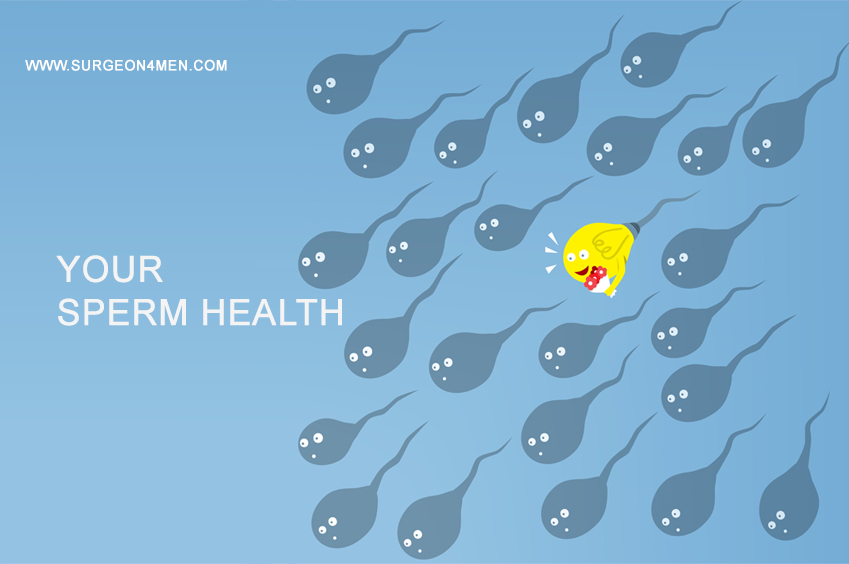Your Sperm Health
It has been observed that most men don’t pay much attention to the topic of fertility or sperm health until they decide to start a family; but is this a healthy approach?
Experts suggests that maintenance of reproductive health is important for a number of reasons. For instance, an average male must produce a large number of healthy and viable sperms in order to ensure an uneventful pregnancy. In addition, since sperms are also a source of genetic information, it is very important that the DNA of sperms is fully intact to minimize the risk of genetic disorders in the offspring.
What Can Be Done To Maintain Adequate Sperm Health?
Every male (regardless of age and race) should take optimal measures to maintain sperm health. For instance, regular physical activity and exercise is known to boost the secretion of testosterone, which in turn helps in maintaining libido and production of sperms in the testicles. Other helpful strategies that can directly boost your sperm health are:
- Increasing the intake of antioxidants and fresh fruits/ vegetables/ seeds in the diet (such as pumpkin seeds, berries, parsley)
- Consumption of special nutrients (such as vitamin E, vitamin C, zinc and B12) that are known to improve the vitality of sperms.
- Maintaining a healthy lifestyle, free from toxins and hazardous compounds that may alter the biochemical balance of hormones.
- Considering folate supplementation (in a dose of 400 milligrams/ day) by men can minimize the risk of congenital defects and genetic abnormalities in the offspring.
Since physiological aging is associated with declining fertility, males over 35 years should take extra caution by eliminating toxic compounds and chemicals from diet; for example:
- Quit smoking as nicotine and other chemicals (or toxins) present in the cigarette smoke can cause vascular inflammation.
- Minimize the consumption of alcohol as not only does alcohol breakdown products affect mood, strength and stamina; but can also suppress male fertility by damaging liver (which regulates the production of vital hormones and neurotransmitters involved in the production of testosterone).
- Keep your body weight in strict check as being under-weight or over-weight can kill your libido and stamina in the bedroom. Most importantly, weight issues suggests metabolic derangements that may present with other serious complaints as well.
Study reported in the American Journal of Physiology-Endocrinology and Metabolism (2) suggested that sperm changes that occur secondary to obesity and metabolic dysfunction can be reversed by diet modification and physical workouts.
What Are Some Common Health Issues That Can Interfere With Sperm Health?
- Cardiovascular or circulatory dysfunction
- Uncontrolled and chronic diabetes
- Thyroid dysfunction or abnormalities of other endocrine glands
- Malignancy (especially cancers of reproductive tract)
- Long standing or poorly managed infectious conditions of genital tract
- Complete or irreversible obstruction of tubules that transmit sperms
- Weight gain or obesity can also aggravate the risk of endocrinological disorders
- Genetic disorders or conditions
It is always a good idea to see a registered healthcare professional if you are experiencing difficulty in impregnating your partner.
What Can Be Done If Semen Sample Is Unhealthy/ Inadequate?
If no treatment or remedy seems to work, you should consider other alternatives (or assisted reproductive techniques) to achieve fruitful results. This includes:
- Frozen embryo transfer (FET)
- Zygote intrafallopian transfer (ZIFT)
- In-vitro fertilization
- Gamete intrafallopian transfer (GIFT)
- Artificial insemination
- intracytoplasmic sperm injection (ICSI)
The choice of treatment and success rate varies; depending on patient factors, preferences and overall health status.
References
1. Mora-Esteves, C., & Shin, D. (2013). Nutrient supplementation: improving male fertility fourfold. Semin Reprod Med, 31(4), 293-300.
2. Palmer, N. O., Bakos, H. W., Owens, J. A., Setchell, B. P., & Lane, M. (2012). Diet and exercise in an obese mouse fed a high-fat diet improve metabolic health and reverse perturbed sperm function. American Journal of Physiology-Endocrinology and Metabolism, 302(7), E768-E780.
3. Martenies, S. E., & Perry, M. J. (2013). Environmental and occupational pesticide exposure and human sperm parameters: a systematic review. Toxicology, 307, 66-73.
